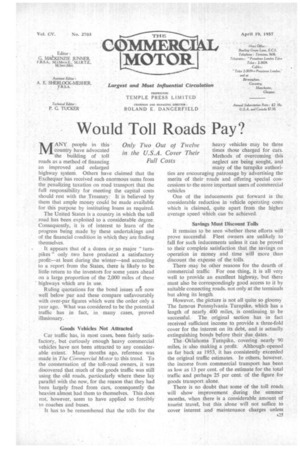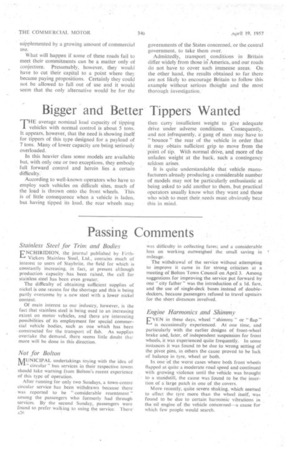Would Toll Roads Pay?
Page 27

Page 28

If you've noticed an error in this article please click here to report it so we can fix it.
MANY people in this country have advocated the building of toll roads as a method of financing an improved and enlarged highway system. Others have claimed that the Exchequer has received such enormous sums from the penalizing taxation on road transport that the full responsibility for meeting the capital costs should rest with the Treasury: It is believed by them that ample money could be made available for this purpose by instituting loans as required.
The United States is a country in which the toll road has been exploited to a considerable degree. Consequently, it is of interest to learn of the progress being made by these undertakings and of the financial condition in which they are finding themselves.
It appears that of a dozen or .so major " turnpikes " only two have produced a satisfactory profit—at least during the winter—and according to a report from the States, there is likely to be little return to the investors for some years ahead on a large proportion of the 2,000 miles of these highways which are in use.
Ruling quotations for the bond issues art now well below par and these compare unfavourably with over-par figures which were the order only a year ago. What was considered to be the potential traffic has in fact, in many cases, proved illusionary.
Goods Vehicles Not Attracted Car traffic has, in most cases, been fairly satisfactory, but curiously enough heavy commercial vehicles have not been attracted to any considerable extent. Many months ago, reference was made in The COmmercial Motor to this trend. To the consternation of the toll-road owners, it was discovered that Much of the goods traffic was still using the old roads, particularly where these lay parallel with the new, for the reason that they had been largely freed from cars, consequently the heavies almost had them to themselves. This does not, however, seem to have applied so forcibly to coaches and buses.
It has to be remembered that the tolls for the heavy vehicles may be three times those charged for cars. Methods of overcoming this neglect are being sought, and many of the turnpike authorities are encouraging patronage by advertising the merits of their roads and offering special concessions to the more important users of commercial vehicles One of the inducements put forward is the considerable reduction in vehicle operating costs which is claimed, quite apart from the higher average speed which can be achieved.
Savings Must Discount Tolls It remains to be seen whether these efforts will prove successful. Fleet owners are unlikely to fall for such inducements unless it can be proved to their complete satisfaction that the savings on operation in money and time will more than discount the expense of the tolls.
• There may be other reasons for the dearth of commercial traffic For one thing, it is all very well to provide an excellent highway, but there must also be correspondingly good access to it by suitable connecting roads, not only at the terminals but along its length.
However, the picture is not all 'quite so gloomy The famous Pennsylvania Turnpike, which has a length of nearly 400 miles, is continuing to be successful. The original section has in fact received sufficient income to provide a three-fold cover for the interest on its debt, and is actually extinguishing bonds before their due dates. The. Oklahoma Turnpike, covering nearly 90 miles, is also making a profit. Although opened as far back as 1953, it has consistently exceeded the original traffic estimates. In others, however. the income from commercial transport has been as low as 13 per cent, of the estimate for the total traffic and perhaps 25 per cent. of the figure for goods transport alone.
There is no doubt that some of the toll roads will show improvement during the summer• months, when there is a considerable amount of tourist travel, but this alone will not suffice to cover interest and maintenance charges unless sdpplemented by a growing amount of commercial Use.
What will happen if some of these roads fail to meet their commitments can be a matter only of conjecture. Presumably, however, they would have to cut their capital to a point where they became paying propositions. Certainly they could not be allowed to fall out of use and it would seem that the only alternative would be for the governments of the States concerned, or the central government, to take them over.
Admittedly, transport conditions in Britain differ widely from those hi' America, and our roads do not have to cover such immense areas. On the other hand, the results obtained so far there are not likely to encourage Britain to follow this example without serious thought and the most thorough Investigation.




























































































